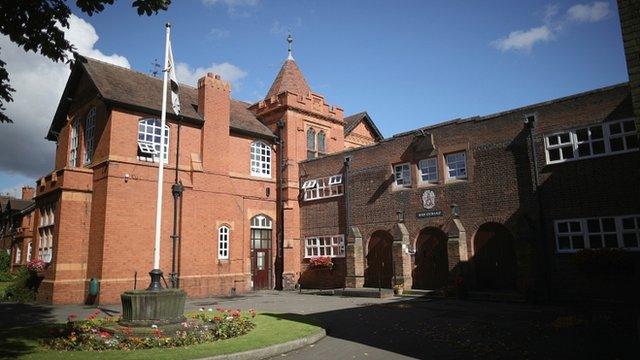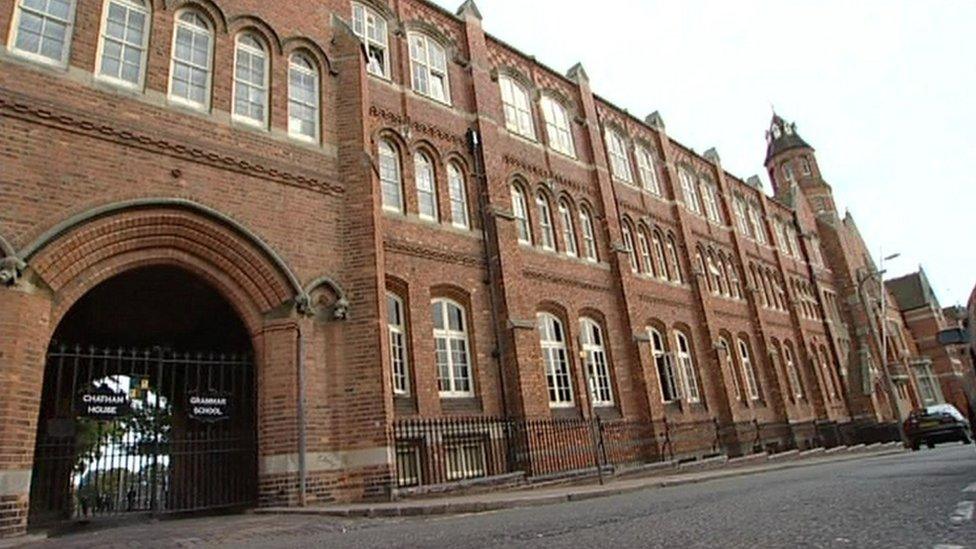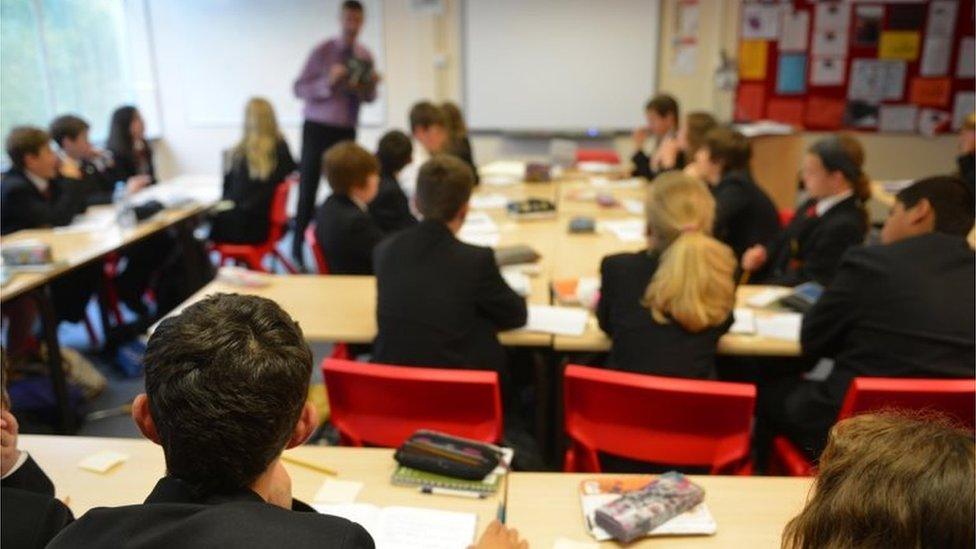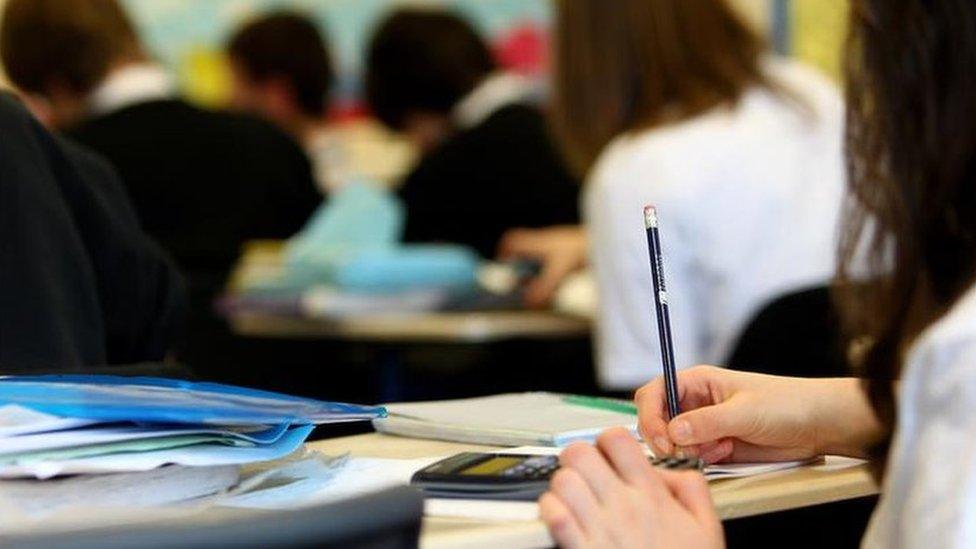May heralds expansion in school selection by ability
- Published
- comments
Grammar schools: May's vision of a 'great meritocracy'
All schools in England are to be given the right to apply to select pupils by ability, under plans also allowing grammar schools to expand.
The prime minister's plans suggest schools becoming selective and new and expanding grammars will take quotas of poor pupils or help run other schools.
Theresa May says the ban on new selective schools has been in place too long and has held many pupils back.
But Ofsted's chief inspector said the changes would undo years of progress.
Labour says the plans will "entrench inequality".
In a major speech, the prime minister said: "For too long we have tolerated a system that contains an arbitrary rule preventing selective schools from being established - sacrificing children's potential because of dogma and ideology.
"The truth is that we already have selection in our school system - and it's selection by house price, selection by wealth. That is simply unfair.
"We are effectively saying to poorer and some of the most disadvantaged children in our country that they can't have the kind of education their richer counterparts can enjoy."
She added that schools already selected on the basis of specialist disciplines like music and sport, adding: "We should take the same approach to the most academically gifted too.
"So I want to relax the restrictions to stop selective schools from expanding, that deny parents the right to have a new selective school opened where they want one, that stop existing non-selective schools to become selective in the right circumstances and where there is demand."
But Mrs May said the government would use the approvals process to prevent new areas of the country having a limited "binary" choice or schools.
Education Secretary Justine Greening says secondary modern schools will not return
She also said: "People get lost in the argument about whether the grammars schools of the 1950s and 60s improved social mobility or not. But I want to focus on the new grammars of the future: those that will be just one element of a truly diverse system."
The plans will also include the ability for bright children to join grammar schools, not just at 11, but at 14 and 16 as well.
The speech announced an end to the current ban on opening new grammars introduced by Labour in 1998. It is thought that an Act of Parliament would be needed for the ban to be lifted on new selective schools opening, but a change in the law may not be required for grammar schools to expand.
A consultation is to be held on ways to make new selective schools and expanding grammars more inclusive so that places are not limited to families who can "pay for tuition to pass the test".
The government also wants to raise the current maximum level of university tuition fees to £9,250 per year.
Chief inspector of schools Sir Michael Wilshaw warns about expansion of grammar schools
Ofsted's chief inspector of schools, Sir Michael Wilshaw, said the idea that poor children would benefit from a return of grammar schools was "tosh" and "nonsense".
He told the BBC: "My fear is by moving to a grammar and secondary modern system - because, let's face it, that's what we'll have if you divide at 11 - we will put the clock back, and the progress we have made over the past 10 to 15 years will slow."
Education Secretary Justine Greening told the BBC the government wanted to create 21st Century grammar schools that would "turbo charge" the education and prospects of disadvantaged children.
This was not about returning to secondary moderns, she said, but about giving parents more choice.
'Regressive move'
Labour leader Jeremy Corbyn said his party would block the proposals in the House of Lords.
"Fundamentally, it's the same as the old 11-plus system, in that it is dividing children on the basis of their perceived ability at the age of 11.
"I don't think that's a good message for our children."
He added that comprehensive schools "help social mobility, help children develop at their own pace and bring communities together".
There are also plans to make tests for independent schools qualifying for charitable status more rigorous.
Private schools reduce their tax bills through this, and Mrs May said a consultation would be held on how to achieve a greater public benefit in return.

In summary: main proposals

Existing grammar schools could expand and new ones could be opened
Existing grammar schools in England to be allowed to expand, backed by £50m of new funding
All state schools in England to be allowed to select pupils by academic ability "in the right circumstances" and where there is demand
All selective schools will have to meet access conditions, such as taking a share of pupils from low-income backgrounds, setting up a new non-selective secondary or primary school or backing an underperforming academy
New grammars will be able to take pupils at 14 and 16, as well as 11, or take on students from non-selective schools for certain subjects
Universities will be expected to sponsor a state school or set up a new free school as part of an overhaul of fair access requirements
Catholic schools which are oversubscribed and want to expand will be able to choose 100% of new pupils on faith grounds, not 50% as now
All independent schools will have to support state schools in some way, in return for maintaining their charitable status.
Fee-paying schools will have to sponsor or set up a new free school or subsidise places for pupils from more modest backgrounds

Kevin Courtney, leader of the National Union of Teachers, said opening new grammars was a "regressive move and a distraction from the real problems" of funding pressures and teacher shortages.
Tim Farron, leader of the Liberal Democrats, said: "If the Conservatives care about our children's education they should reverse their cuts to school budgets.
"We need to improve all schools, not just let some become grammars.
"Too many pupils are let down by a divisive system that doesn't work."
Former Education Secretary Nicky Morgan said increased selection by ability would be "at best a distraction from crucial reforms to raise standards and narrow the attainment gap and at worst risk actively undermining six years of progressive education reform".
- Published9 September 2016

- Published9 September 2016

- Published8 September 2016
- Published8 September 2016
- Published8 September 2016
